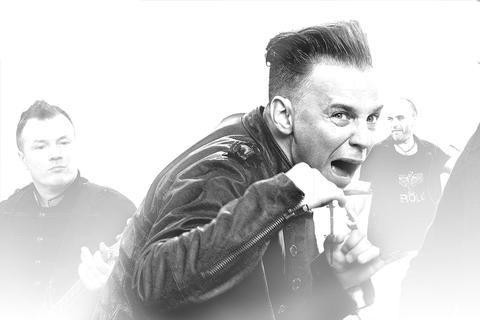Mumiy Troll
Ilya Lagutenko was brought up at the end of the line. Vladivostok is where the Trans-Siberian Railway terminates. Japan and China were locked behind unbridgeable barriers in the Soviet Union of Lagutenko’s youth, but near neighbours compared to Moscow: a 10-hour, 3-plane ride away. Still, a naval base brought in sailors who’d glimpsed life beyond this eastern edge of a then mighty empire. Isolated and unknown even to most Russians, but looking out over the vast promise of the Pacific, there are many worse places than Vladivostok for a rock star to start.
With his band Mumiy Troll, Lagutenko spent the 1990s rewiring the musical mainstream of his home country. Perceiving the music industry’s shaky future, this bestselling group gave away an album to their fans eight years before Radiohead. You can see Lagutenko as an actor in the hit vampire film Night Watch (2004). But his celebrity is less interesting than his experience watching first Communism then a capitalist investment bank collapse from the inside. He has served in the Red Navy, and flung himself into Camden Town at Brit-pop’s height. Chaos doesn’t concern him. The hunger for freedom and experience in the lyrics of Mumiy Troll’s first English-language album, Vladivostok, sum him up. A decade of huge success at home has only encouraged him to go back to the bottom in places where he’s unknown, to roll the dice and see what happens this time.
Born in Moscow in 1968, Lagutenko’s architect father died when he was five months old, after which his mother moved to Vladivostok. “People there do have this feeling that they live on the edge of the world,” he says. “I had romantic dreams about becoming a sailor. The image of them coming back from, say, Japan in the ‘70s stuck in my head. Hitting the town with their double-breasted jackets and flared jeans, they seemed like Martians.”
He had his first, addictive taste of touring as a child, “in a proper, propaganda-style Soviet choir, singing songs about Lenin in Siberian factories.” But the illicit Western pop those Soviet sailors smuggled back was what enthused the boy Ilya. The genre-blurring which would define Mumiy Troll started here. “They didn’t follow any chart trends,” he remembers. “I guess they were buying them for the covers. So that’s why I learned about Genesis and AC/DC and Blondie and Duran Duran at the same time. I didn’t follow any particular style. Anything you got your hands on was exciting, because it was forbidden fruit. Today I still take it as a challenge to write in between genres, opening horizons.”
The ritual of the record player was far more potent than in the West. “You bought the new LP on the black market,” he says lovingly, “and finally you sneak it into your home, you sit with your friends and put it on your record player. I’m still fond of those times, when we spent hours just sitting and staring at the black speakers.” He swapped often unlabelled tapes with friends. With no music media to tell him what he was hearing, he dreamed the details. “I remember how happy I was then, aged 10 or 11. I created the bands’ names and album covers, then non-existent hits by fictitious bands, then invented my own showbiz, where I had my own band. And eventually those childish games became my life. The day I realised I’d gone that far with it, I wasn’t really surprised. I said, ‘Okay. What else?’”
Lagutenko formed his first band, Bunny Pee, aged 11, and Mumiy Troll four years later. “It was psychedelic punk,” he says of these first steps. “We couldn’t play at all. So our first music experiments were noise things, with cardboard boxes, toy pianos, whatever we could get. I really regret those recordings didn’t survive. They were real punk.”
When Mumiy Troll got the license Soviet musicians needed, it was for an unlikely debut gig. “We played at a so-called Festival of Patriotic Song, on the verge of perestroika,” he laughs. “The local papers called us the most terrible thing they’d ever seen, because we called ourselves a rock band and sang about aliens from outer space, not American imperialism trying to conquer the world. We were blacklisted, as music which is not good for a young Communist Party member to hear. It gave us our first PR. I was delighted.”
Conscription into the Navy from 1987 to 1989 anyway finished Mumiy Troll Mark One, as Lagutenko finally saw the wide world he’d dreamed of. Then in 1991, the Soviet Union, and the reality he had been raised in, abruptly ceased to exist. “Overnight, you’re free of any obligations you’ve been taught,” he remembers. “There were no real plans, no jobs, nothing really. There was chaos, but we took it for granted. You do what you want to do, just survive. It was the start of a real adventurous journey, when you rely on whatever skills you’ve got.”
Lagutenko and his friends were on the new Russian music industry’s ground floor, organising parties, selling tapes. Then the Mandarin he’d studied in university took him to London in 1994, working for an investment institute in a venture between Russians and Chinese and the capitalist monolith Barings Bank. Which promptly collapsed as utterly as the Soviet Union. High and dry again, he dusted himself down, doing catering for school trips and working as an extra at Pinewood. And at Brit pop's height, he devoured London’s music.
“I was going to gigs in Camden Town every day,” he recalls. “Mostly I went to little pubs and clubs, seeing total unknowns. I’m really grateful to London at that time. Then my old classmates called me just in time and said, ‘Why don’t we record an album of your songs?’”
Back in Russia, Mumiy Troll’s real career started. The current line-up - Lagutenko (guitar, vocals) joined by Yuri Tsaler (guitar, keyboards), Eugene “Sdwig” Zvidionny (bass) and Oleg Pungin (drums) - was set by 1997, when their debut album Morskaya went to number one. Along the way, it defiantly disproved every truism of their home music industry. “We’ve even been labelled a Brit-pop band in Russia, though we didn’t follow that template,” Lagutenko says of their music’s sound. “Mumiy Troll albums did more to popularise British music in Russia than anyone. All those bands like Suede and White Lies who play Russia every 6 months now were never played on the radio before our success. That first album proved to the industry that you can make money on rock’n’roll. Then MTV came to Russia in 1999, we were the first Russian act on, and we became famous overnight. We were a totally new thing. We spoke to the Russian generation of the ‘90s, who never really lived under Soviet times, and didn’t know who Lenin or Marx was, and travelled easily between countries. Life changed in Russia then. For the better, I think.”
This generation-defining success hasn’t faltered for Mumiy Troll in seven subsequent albums. But that first number one brought them no money. This preview of the problems which have consumed the Western music business also saw them find an early solution. “Russia’s in the avant-garde of pirate downloads,” Lagutenko laughs. “And I really didn’t expect to get any money from those records, because when we did the distribution deal, I looked into the eyes of the guy who owned the company, and realised that I would never get any money from a guy like that. But as he’s probably the only guy who thinks he can make money on my record, okay, let him at least get this music to the audience. Then we realised we can’t beat the pirates, so we thought, fuck it, and gave a 1999 album away as a free download - way before Radiohead.”
Heavy touring means Mumiy Troll are still prosperous heroes at home. But the boy who stared at an ocean he couldn’t wait to cross in Vladivostok has always seen a bigger picture. Each year, they strike out for new territories, starting over again as unknowns in Mexico, Greenland, China (where Lagutenko sang in Mandarin) and the US.
“You can get used to all those comforts, when other people treat you well because they’re making money from you, and it’s not really good for the brain,” he says. “Singing to the guy who just came here to have a couple of beers and who doesn’t give a damn about you, the moment he sings along is total bliss for me. Because you understand your differences in skin or languages mean nothing. Some of my bandmates call those gigs to 20 people masochism, though. S&M rock’n’roll!”
Lagutenko thinks he knows what his band has to offer, the same thing that first set them apart at home: an authentic unconcern for trends; casual personal truth that can’t be faked. “Watching other bands, I always think I can do it better,” he says. “ I just need to show it to people. Just so the audience get the real stuff. They can be admiring one thing - but I know what else to show you.”
Vladivostok sees Mumiy Troll rising fully to this challenge, as Lagutenko writes and sings in English for the first time. “In ancient times, people would sail somewhere looking for discoveries and something better, even if they don’t know where it is, or how it’s supposed to be,” he says. “These days, touring with a rock band allows you to discover what’s really inside you, and how to communicate with different people. This is why we’re doing this international release. I know my limitations, being from Russia, a basically non-rock’n’roll country. I know that I’m not 18 years old any more, and I sing in Russian and English is not my mother tongue. But, you hit those limits and go further, because your adventure is still on.”
The adventure’s challenges have already been considerable. “It was quite a task for me to write English lyrics for this album, and I on purpose wrote cautiously,” he explains. “I didn’t want to experiment as I do in Russian. If you’re going to a dinner party of people you don’t know well, you try to be polite, and you won’t start with your favourite joke, it might be too much for your host. We did the same thing with this album. We tried to be polite with potential new friends. We’ve started work on the follow-up already, and it will be more free-form, Mumiy Troll territory.”
Lagutenko has always quietly maintained a presence in London, where his son Igor has lived for much of his life. Most of Mumiy Troll’s albums have been recorded there, passing Peter Gabriel or Kylie Minogue in the corridor. He was back a few weeks ago, pacing the streets where he once worked, wondering how Britain will receive Vladivostok. “I walked down Mayfair at 3 am, thinking, ‘Is there any place for a Russian rock band now?’” he says. “Coming back with a totally different mission is exciting for me. I don’t know where it will get us to. But you’re not really a rock’n’roll band if you’re not dreaming of headlining Glastonbury and Wembley Stadium one day.”
Lagutenko splits his time these days between Moscow and the Hollywood Hills, on the far side of the Pacific from where he grew up, quietly maintaining a catalogue of his songs and others in the entertainment industry’s heart. But on one of the new album’s most striking songs, “Vladivostok Vacation”, he still dreams of home.
“I do want to get back to Vladivostok one day, to live by the ocean,” he muses. “The song’s an apocalyptic, darkly humorous picture of the city, where we’re sending mayday signals. We’re leaving, but we’re still inviting you cordially to visit this place with us.”
Mumiy Troll’s invitation from Vladivostok to the world is equally open and intriguing; a new message from rock’s other side.
















